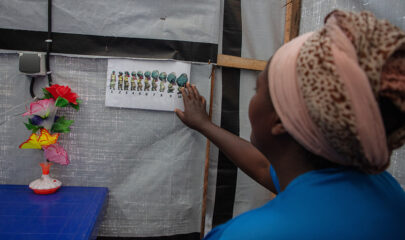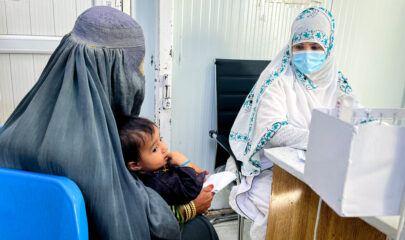On the morning of May 12, I woke up to the news that a sickening crime was committed in the maternity ward of a Doctors Without Borders/Médecins Sans Frontières (MSF) supported hospital in Kabul, Afghanistan.
Shortly after 10 a.m., attackers stormed Dasht-e-Barchi Hospital, went straight to the ward full of babies, new and expectant mothers, and, as my colleague Frederic Bonnot describes, started “shooting women in their beds.”
“It was methodical,” says Bonnot, head of programs for MSF in Afghanistan “Walls sprayed with bullets, blood on the floors in the rooms, vehicles burnt out and windows shot through.”
The attack came at a busy hour in the hospital, with 26 mothers in the ward. Some managed to find shelter. Of the 17 who couldn’t, six were injured and 11 shot dead, three of them in the delivery room. Patients and staff from the MSF-supported maternity ward who managed to get to the hospital’s safe rooms could hear shooting and explosions “everywhere” as the assault lasted an eternal four hours.
Some patients were evacuated to surrounding hospitals. Two children under 10 also lost their lives — they were at the hospital for routine vaccinations.
Despite a U.S.-Taliban peace agreement signed this past February, Afghanistan is still at war, and violence is all too common. But what happened on May 12 is a different shade of sinister.
“It’s shocking. We know this area has suffered attacks in the past, but no one could believe they would attack a maternity ward,” Bonnot says. “They came to kill the mothers.”
Sitting in COVID-19 isolation in my Canadian home, I feel outrage, sadness and repugnance. What must the survivors be going through? It strikes such a deep and awful chord. We lost an MSF colleague too. A midwife. I did not know her personally, but we worked according to the same MSF principles, which commit us to providing assistance to people in distress regardless of who they are or where they are.

In a very real sense, all that I do here in Canada is in support of her efforts and those of every front-line MSF worker. This brings her death closer to me, and it further ignites my outrage.
We cannot erase or side-step the pain and tragedy of this event. But we are not powerless either.
We can redouble our resolve to channel our compassion toward the survivors, their communities and others in dangerous situations around the world. And we can channel our anger into rejecting the normalization of hospital murders.
Even in war, there are rules. International Humanitarian Law does not legislate against war itself, but it defends a space for humanity within it. Non-combatants are protected, as are civilian spaces, hospitals especially. Put bluntly: hospitals are not targets!

Deliberate attacks and bombings of health structures from Afghanistan to Yemen, South Sudan and beyond have horrifyingly increased in recent years, but we cannot let this become the norm. As Canadian doctor and former MSF President Joanne Liu said following the calculated military bombing of an MSF-supported hospital in Kunduz, Afghanistan in 2015: “Medical ethics cannot be buried by war.”
Whether we frame our outrage by the ethics of medicine or the rules of war, we must continue to cry out to protect a space, even amidst violent conflict, in which we can care for one another and express our humanity. The frameworks of laws and ethical standards are the mechanisms through which we agree — collectively as states, institutions and individuals — to protect and assist one another, particularly when we are at our most vulnerable, and it is difficult to imagine a more tender and vulnerable moment than childbirth.

As humanitarians and health workers, all we have is our medical care and our voice. Defending the space for humanity takes more than that. Governments, armed groups and global institutions hold the power and the responsibility to protect.
For the time being, MSF has suspended its support for the maternity ward of Dashte- Barchi Hospital. This is the secondary tragedy: less medical care for the mothers and babies in this catchment area of more than 1.5 million people. Our staff, including midwives, doctors, cleaners, nurses, cooks, watchmen and administrative staff, all provide invaluable services to women in need of lifesaving care. Maternal mortality is already extremely high in Afghanistan — more than 60 times higher than in Canada — so likely the senseless death didn’t end on May 12.
At a time when we celebrate the strength of our front-line health workers in the global struggle against COVID-19, let’s use this momentum and our outrage at this attack to redouble our global resolve to protect patients, hospitals and health workers everywhere. They are not a target.
(This article was first printed in the Toronto Star on May 27, 2020)
On June 15, MSF announced its decision to end activities and withdraw from Dasht-e- Barchi, following the brutal attack on May 12.
The decision comes with the understanding that while no information has emerged about the perpetrators or motive of the assault, mothers, babies and health staff were its deliberate target and similar attacks may repeat in the future.
“To remain would mean to factor such loss of human lives as a parameter of our activity and this is unconceivable,” says Thierry Allafort-Duverger, MSF director general.


